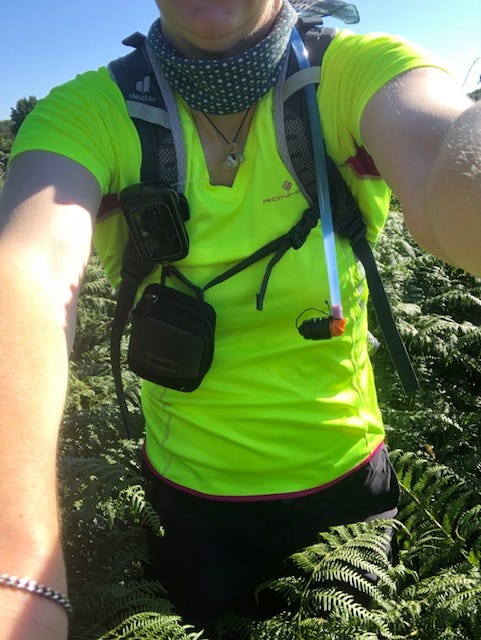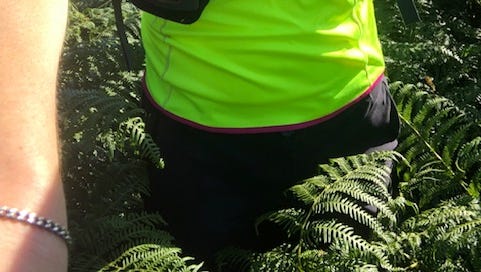11. Reasons for getting lost: Distraction, part 2
Do I fare any better with deliberate distractions?
First some sad news:
The walking boots I had been given for my birthday towards the end of last year are no more. They haven’t fitted my feet for a while, and they’ve been leaking like a sieve for a while longer than that. Sick of tripping over them by the back door, I’ve finally let them go.
Goodbye, old friends. Your red laces live on.
Dear Reader,
I am easily distracted. It’s really hot here today and I’m finding it hard to concentrate on what I want most to be doing – writing – yet finding it irritatingly easy to fritter away my time upstairs tidying my desk, stressing about world affairs (and domestic ones) and half-wondering what I’m going to be cooking for supper1 because I haven’t consulted my list in the kitchen.
See? I digress. Concentrate, Rebecca.
Part 1 of the results of my informal research last week into whether distraction plays a part into why I can’t find my way around explored whether niggling, persistent distractions, such as stones in my boots, were a factor. On my Monday walk this week I thought about the other two types of distraction which often capture my attention.
DELIBERATE DISTRACTIONS
Deliberate distractions offer me welcome breaks from walking, and are delightful experiences in their own right. They’re positive, friendly affairs, and tend to result in a conscious decision by me to be led astray. Coming across a shady tree stump on which to take a break I hadn’t yet planned, for instance, or the song of a skylark making me want to spot its tiny, fluttering shape in the sky miles above me, are just such scenarios.
I view these as a treat. I ask myself whether I want to stop to hear the birdsong, or drink in the scent of honeysuckle, or lean on a convenient fence post to write some notes for this Substack post.
Reader, I do want to. And I enjoy soaking up these distractions.
Once I’ve had my fill I’ll move on, happy that I’ve had a break, listened to the birds or filled another page of my notebook with my downloaded thoughts. I’m relaxed and able to pick up my walk again just where I’d left it.
ACUTE DISTRACTIONS
Distractions aren’t all positive, of course. As irritating as the relentless, chronic discomfort of last week’s stones in my boots is the acute distraction – something which needs my attention right now, without thinking about it.
On Monday’s walk I found my footpath almost blocked by a waist-high overgrowth of bracken on a badly-kept public footpath. I had to wade through it, but my frustration and impatience about having this negative and unanticipated scenario to deal with caused me to miss the stile in the hedge which – had I noticed it – would have led me to the next part of the route I had planned. Having fought the bracken and missed the stile I was hot, bothered, distracted, cross and lost.

So it’s the more challenging distractions, not the positive ones, which throw me off course. Because I don’t have a deliberate planning process for dealing with them: they just happen.
And when I just plough on?
Reader, I get lost.
That’s how it always works. In that it doesn’t work.

‘Stop, look and listen’ is a mantra we all learned as kids as the importance of road safety was impressed upon us. The need to be present and intentional when you’re crossing the road, of course, is obvious. Yet it seems as if I’m only intentional in the way I deal with distraction if the distraction is a positive one. In that case I deliberately stop, look and listen. Funny, then, that for the distractions that threaten danger or discomfort I am not deliberate, not intentional. I seem to let them happen and I don’t plan an outcome.
On Monday as I leaned against that fence post to write down some of these thoughts about distraction I became – yes – suddenly distracted from that task by a tickly, fluttering feeling on my lower leg. It was a huge drinker moth, its fuzzy honey-coloured body the size of my thumb, its massive wings repeatedly brushing my skin. I’d disturbed it in the long grass by the fence as I was pulling my notebook out of my pocket. This distraction was brilliant – I fished my phone out of my other pocket to identify it with the ‘Seek’ app. Job done, I carefully removed the moth from my leg, popped it back into the long grass and continued my walk in the right direction.
Deliberate distractions are the things I like to encounter on my walks: a tiny spiral of curled-up caterpillar on meadow grass, a Spitfire flying over, or that beautiful moth on my leg. Stopping to enjoy them has its own momentary planning process which I’ve learned I also need to adopt for such unhappy distractions as the stones in my boot and the impassable path.
WHAT I’VE LEARNED
The things that throw me would throw me less if I were more intentional in the way I deal with them. If I were only to deal with every distraction in a deliberate fashion, perhaps I wouldn’t get so lost.
So I’ll start as I mean to go on! I’m off to the kitchen to find out what I’m supposed to be cooking tonight.
Love,
Rebecca
If you enjoyed this post, please let me know by clicking the heart. Thank you!
Do you get distracted? Do you differentiate in how you deal with different kinds of distractions?
Thank you for reading! If you enjoy ‘Dear Reader, I’m lost’, please share and subscribe for free.
Quiche Lorraine.





Distractions are little gifts from our brains 😉
Great story. One of the beauties of reading posts from other countries is learning new terms like bracken and stile. A suggestion, for next time, might be to show us the moth or whatever creature you encounter. :)